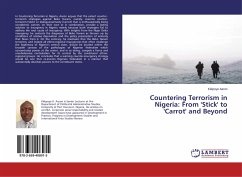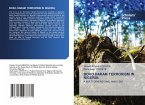In Countering Terrorism in Nigeria, Aaron argues that the extant counter-terrorism strategies against Boko Haram, namely, coercive counter-terrorism ('stick') or dialogue/amnesty ('carrot') that is enthusiastically being considered, cannot, on their own or in combination, provide a lasting solution to insurgency in Nigeria mainly because both strategies fail to address the root cause of insurgency. With insights from the Niger Delta insurgency, he contests the diagnoses of Boko Haram as thrown up by conditions of relative deprivation and the policy prescription of amnesty that flows from it. On the contrary, he maintains that the Boko Haram terrorism, and indeed all ethno-regional insurgencies that often challenge the legitimacy of Nigeria's central state, should be located within the broader canvass of the pathologies of Nigerian federalism which concentrates power at the centre, and in so doing, compels a fierce and unwholesome contestation for its control by the constituent ethno-regional groups. He concludes that a winning counter-insurgency strategy would be one that re-invents Nigerian federalism in a manner that substantially devolves powers to the constituent states.








